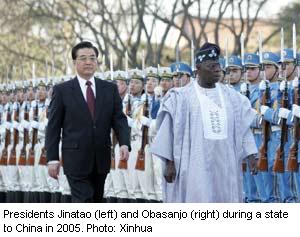Sino-Economics and Nigerian Technological Breakthrough
 Who wouldn’t want to do business with a humongous nation of one billion people?
Who wouldn’t want to do business with a humongous nation of one billion people?And if the bounty is some 2 billion in US dollars, it’s tough to say “NO”- even if you know that nation has a mile long rap sheet on human rights violation and shady dealings.
This is the case between the state-controlled CNOOC Ltd. of China, and Nigeria's offshore oil bloc OML 130 currently owned by a private Nigerian company South Atlantic Petroleum (Sapetro) Ltd.
The foray of CNOOC into the Nigerian oil industry and the $ 2 billion deal has received decent coverage in the Blogosphere, as I write this post these blogs: Nigerian Times, Jewel in the Jungle, Black Looks and others have posted some interesting op-eds on the topic.
Despite China’s unscrupulous business style and stinky rap sheet on human rights , the economic benefits of trade with Beijing appear to transcend politics and / or ethics in under-developed regions such as Africa. And this is understandable- it is a “hard sell” to preach business ethics in a poverty-stricken continent as Africa, particularly when one considers the carrots dangling from China limbs.
China has one of the biggest and largest markets in the world, it’s trade surplus peaked at $102 billion in 2005 and “more than triple the $32 billion gap recorded the year before”. The United States and the European Union (EU) have not been blind to this fact, and have been jostling and scheming each other to get the juiciest and biggest bite off the 1-billion pound steak China is offering.
“China's biggest trading partner was the EU, with two-way trade estimated at $217.3 billion, up 22.6 percent from the year before. The U.S. was second, with imports and exports totaling $211.6 billion, up 25 percent year-on-year. Trade with Japan rose 9.9 percent to $184.5 billion…”China on the other hand, has been taking advantage of all the attention and even much more- the lax enforcement of intellectual property laws in the country. Not only has the western world pumped their Pounds, Dollars and Euros into China in return for cheaper labor and extensive market; they have- albeit inadvertently- expedited its technological growth.
With its abundant and relatively cheap labor, and supposedly stolen technology, China is now on the offensive. Sino entrepreneurs have their eyes locked not only on the western hemisphere, but also on the rural nooks and crannies of Africa and South-East Asia, and it is just a matter of time before China becomes the largest economy in the world. China just replaced “Italy as the world's 6th-largest economy, trailing Britain and France and would jump to No. 4, behind the United States, Japan and Germany, if it added in its territory of Hong Kong”, states MSNBC
It is unfortunate that the preponderance of western multinationals in the oil industry hasn’t led to any sustainable technological growth after four decades of operation in Nigeria. The only way Africa, and Nigeria in particular, can reap more than just pocketing the forex handed out by the Chinese and other investor-nations is to create an enabling environment for technology transfer by ungrading old infrastructure and learning to acquire and retain technology- and this has been central of the majority of issues discussed on Grandiose Parlor.
China has been gradually mopping up African resources- timber, copper, coal, gold, and recently oil. According to the BBC, China has also recently moved into petroleum in Gabon, Algeria, Angola and Egypt. African oil is largely responsible for a 40% increase in trade with China in a single year.
The Chinese foreign Minister Li Zhaoxing is beginning a week-long visit to Africa, and most probably to consolidate the Nigerian oil deal and others . Now that Africa / Nigeria has chosen to deal with China, Africa / Nigeria must be able to justify this relationship on the long run by acquiring a technological breakthrough- just as the Chinese have done over the years.
Tags: Africa Nigeria China Oil Business Technology










<< Home